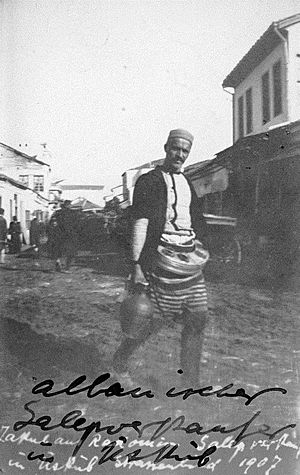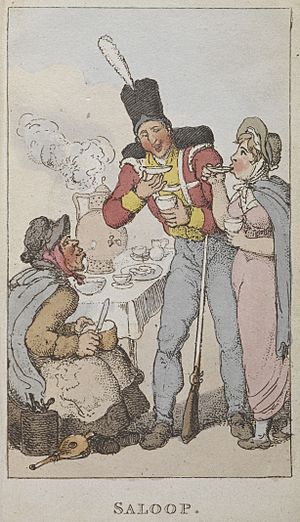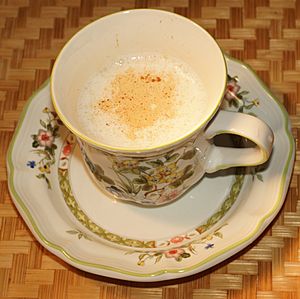Salep facts for kids
Salep (pronounced sah-lep), also called sahlep or sahlab, is a special flour made from the roots of certain types of orchids. These roots are called tubers. Salep contains a healthy, starchy substance called glucomannan. People use salep flour to make tasty drinks and desserts. It's very popular in countries that were once part of the Ottoman Empire, especially in the Middle East, where it's a traditional winter drink. However, because so many people enjoy salep, some orchid plants are disappearing in places like Turkey and Iran.
What's in a Name?
The word "salep" comes from an Arabic word, "saḥlab." This word means "fox's" and was used to describe a type of orchid. This name came into English through Turkish and French in the mid-1700s.
A Look Back in Time

Long ago, the Romans used ground orchid roots to make drinks. They gave these drinks different names, like satyrion.
Salep became a very popular drink in the lands of the Ottoman Empire. People even thought it helped young women become plumper before marriage. The drink then spread to countries like England and Germany. It was popular before coffee and tea became common. Later, coffee houses sometimes offered salep as another warm drink.
In England, this drink was known as saloop. In the 17th and 18th centuries, people made saloop by adding salep powder to water until it got thick. Then they sweetened it and added flavors like orange flower or rose water. Sometimes, people in England even used roots from local British orchids instead of the ones from Turkey.
Saloop: A Refreshing Drink

Saloop was a hot drink popular in England during the 18th and 19th centuries. At first, it was made from salep, often from a city called Smyrna (now İzmir in Turkey). Later, people started using roots and leaves from the sassafras tree, which grows in North America. This plant helped thicken the drink and also made people feel more awake.
Saloop was a cheaper alternative to tea and coffee, which were more expensive. It was served in a similar way, often with milk and sugar. People also believed it could help with different illnesses.
Salep Today
Today, the drink sahlab is often made with hot milk instead of water. Other desserts are also made from salep flour. These include salep pudding and a special kind of ice cream called dondurma. The Kahramanmaraş region in Turkey is famous for making a lot of sahlab, known as Salepi Maraş.
The popularity of sahlab in Turkey has caused the number of wild orchids to drop. Because of this, it became illegal to export real salep from Turkey. So, many instant sahlab mixes you find today use artificial flavors. Salep is also a favorite hot drink in Greece, especially sold on the streets during cold months. It's very popular in many parts of the Middle East, particularly in the Levant. Families in Turkey often drink the hot version in winter.
It's thought that about 30 tons of orchid roots are collected each year in Turkey. It takes between 1,000 and 4,000 roots to make just one kilogram of salep flour. As some orchid types become rare, traders are now collecting wild orchids in Iran and Greece. Experts believe that millions of orchids were gathered from northern Iran in 2013, with most of them sent to Turkey.
In the Middle East, "sahlab" is a warm, milk-based winter drink. It has a thick, pudding-like texture and is sometimes topped with nuts and cinnamon. A British-Palestinian writer named Joudie Kalla shared in her 2016 cookbook that her mother used to make sahlab for the family when they were sick.
See also
 In Spanish: Salep para niños
In Spanish: Salep para niños


